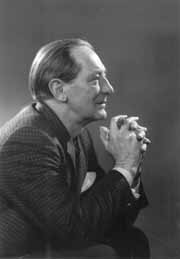
| ||
 | ||
 Royalties from works by Hugh MacLennan will fund a new poetry series PHOTO: NAKASH, MONTREAL |
Canadian poets get helping hand
|
DANIEL McCABE | According to English professor Nathalie Cooke, the best poetry exists on the cutting edge, challenging readers and offering new ways of viewing the world.
But she says poetry also faces the cutting edge in a less desirable way. "As we have seen during the time of recent budgetary restraints, poetry is one of the first things to be cut from the publishing programs of smaller and even larger publishing houses." Cooke is part of a new initiative aimed at giving Canadian poetry a helping hand. The Hugh MacLennan/McGill-Queen's University Press Poetry Series will publish two or three new poetry collections each year. Cooke will head the committee selecting the works to be included in the series. The idea for the series began when McGill-Queen's director Philip Cercone found himself wading through boxes filled with writings and correspondence from the late Hugh MacLennan -- a McGill professor and one of Canada's best-loved novelists. MacLennan willed his intellectual property -- the rights to his works -- to McGill. Many of MacLennan's writings -- including two unpublished novels -- as well as personal correspondence, now reside in the Department of Rare Books and Special Collections. Digital collections librarian David McKnight heads up a project that is making much of this material widely available on the Web. Cercone focuses on the commercial aspects of McGill's MacLennan collection. At the press conference announcing the poetry series, Cercone said, "In going over his files, I was struck by Hugh MacLennan's concern for new Canadian writers. He felt he had been very fortunate and he wanted to do something to help them out." So Cercone thought it might be fitting to honour MacLennan by using royalties from the author's works to publish new writers. He bounced the idea off Secretary-General Victoria Lees, who suggested that poets in particular are in dire need of assistance. Cercone's publishing partners at Queen's University liked the notion and McGill-Queen's went to work on making the poetry series a reality. Cercone says it isn't out of the ordinary for a university press to become involved in non-academic books. About 50 years ago, several university presses began publishing fiction when it became evident that many talented writers were having trouble getting published. "They picked up an entire genre of publishing that otherwise would have suffered," said Cercone. He added that many of North America's leading university presses -- including McGill-Queen's -- still publish works "that are of interest to the thoughtful reader, but which are not downmarket enough to interest the TVGuide crowd. The commercial sector simply is not able to accept more than a portion of the truly excellent material that is produced." The plan for the poetry series is to put out about three books a year, but Cercone says McGill-Queen's won't publish mediocre work to meet any quotas. "If we come across only one quality manuscript in a year, we'll only publish one book that year." Cooke doesn't think quality will be a problem. "We've already received quite a few manuscripts. The competition at the moment is pretty stiff. We're almost ready to draw up a shortlist for the first two titles." Poetry has a distinguished history at McGill. The McGill Fortnightly Review, a journal published by students in the 1920s, showcased the works of poets such as A.J.M. Smith, F.R. Scott and A.M. Klein. In Flanders Field scribe John McCrae taught pathology at McGill, while Irving Layton worked as an editor on The McGill Daily. In the 1950s, the McGill Poetry Series, run by English professor and poet Louis Dudek, published the first works by a talented young McGill student named Leonard Cohen. Cooke says that poetry is still alive and well at the University, as evidenced by her colleague Brian Trehearne's popular poetry workshops and by McGill student publications such as Scrivener and The Pillar. A pair of award-winning McGill poets, classics professor Ann Carson and Islamic studies professor Eric Ormsby, will work with Cooke on the selection committee for the MacLennan series, along with Queen's professors Joan Harcourt, Tracy Ware and Carolyn Smart. Cooke adds that her committee isn't looking for a particular style of poetry -- works that encompass all thematic approaches and techniques will be considered. The only constraints on poets submitting work for the series are that they must be Canadians or landed immigrants, they must supply enough material for an 85-page book and they must have been published at least once before. There is enough money in place to put out at least nine books, Cercone says. The duration of the series will be tied to the royalties McGill receives from future sales of MacLennan's works. "I see the royalties increasing, rather than decreasing," says Cercone, who is currently negotiating with three different companies for the movie rights to MacLennan's Barometer Rising. McGill-Queen's might also publish some new collections of MacLennan's own work. "If we look at his writings on Canada and Quebec, for example, he published pieces in all sorts of different newspapers and journals. We could reprint them together. It's remarkable how relevant these articles are today."
|
|
| |||||